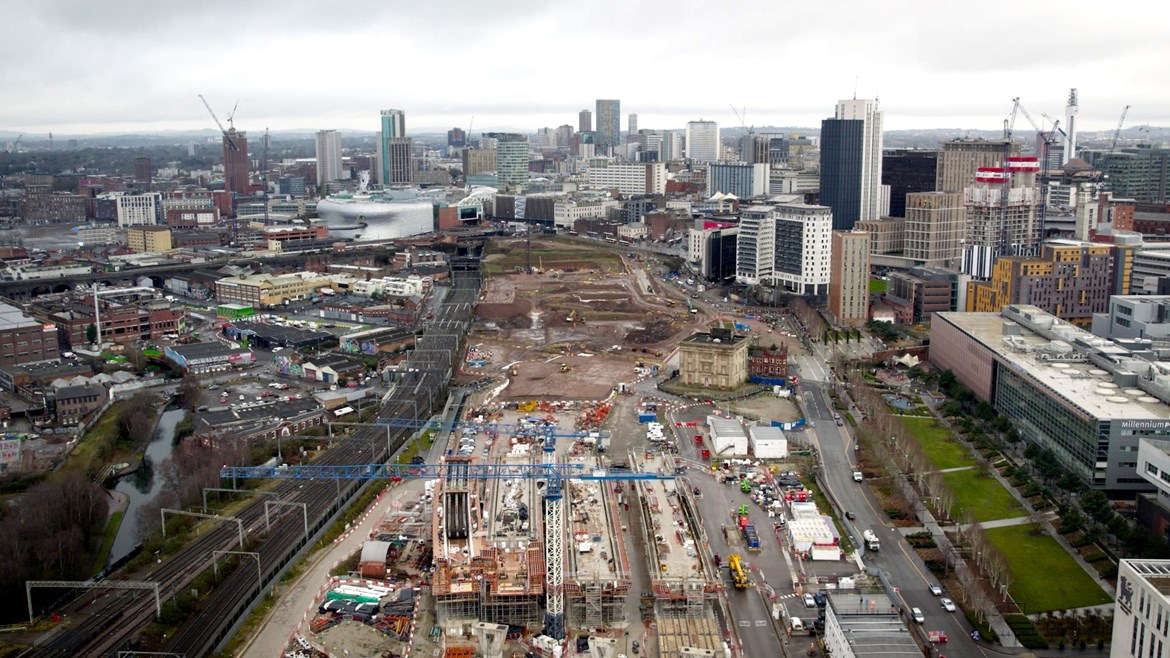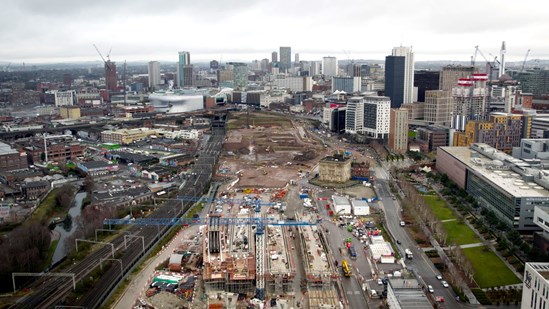New research shows that the future arrival of HS2 in the West Midlands is already driving huge investor confidence in the region, with data pointing to an economic uplift of £10billion over the next 10 years.
Economic analysis of the areas close to HS2’s three hubs in the West Midlands - Curzon Street Station in central Birmingham, Interchange Station in Solihull, and the Washwood Heath Depot and Network Integrated Control Centre - shows dramatic increases in regeneration and investment in the last six years.
Since Royal Assent was granted for the railway in 2017, the number of planning applications seen in a 1.5 mile radius around these three major HS2 hubs has increased by two-thirds.
Over the same timescale, the area of total planned floorspace - including commercial and residential - has increased by 200%, and the planned number of new homes has increased by almost 500% - from 10,000 to 55,000 homes.
According to independent research commissioned by HS2, this increase in investment activity far outstrips any rises in planned development outside of HS2’s impact zones and has occurred despite economic shocks caused by the war in Ukraine and the COVID-19 pandemic. The rate of increase in planned housing within HS2’s impact area has been 14 times greater than elsewhere in the region, with the uplift in total planned floorspace over four times greater.
Since 2017, the construction value of major new projects in HS2’s three impact zones has increased by 240% - from £4.5bn to £15.4bn. This is further evidence of increased investment and activity around the three HS2 hubs.
This building boom is contrary to activity outside of HS2’s impact zones, where the construction value of new planned projects has decreased by 16% in the same period – from £19.3bn to £16.3bn.
The numbers and values of projects since 2017 are also much higher compared to an equivalent period before HS2 was given the green light in Parliament.
Within its three impact zones, it is estimated that HS2 will be responsible for the generation of 41,000 additional homes, 704,000 square metres of new floorspace and 30,835 new jobs.
Putting this in the context of the whole country, since 2017 the West Midlands has been the highest performing attractor of inward investment outside London and the South East, with the number of projects it attracted in 2022/23 second only to the capital.
Sir Jon Thompson, Executive Chair at HS2 Ltd said:
“This new research provides evidence that HS2’s future arrival is already driving transformational regeneration and investment in the West Midlands. It shows that investor appetite, regeneration and investment close to where we’re building our three key assets in the region has surged in the last six years.
“Driven by the promise of enhanced connectivity and heightened investor confidence, HS2’s arrival is spreading prosperity and opportunity to the communities it touches for generations to come.”
Andy Street, Mayor of the West Midlands, said:
“This research demonstrates that HS2 has delivered substantial investment and development opportunities in our region in recent years.
“Whether it’s urban regeneration, improved local transport connections, increased housing provision and of course new jobs, HS2 is benefitting local people, businesses and our wider economy.
“It’s vital that local people see the tangible benefits of major schemes like this.”
Regeneration in places like Digbeth, Washwood Heath and Birmingham Eastside is already clear to see, with multi-million-pound development projects set to deliver new homes, venues, offices, public spaces and leisure facilities.
Digbeth Loc. Studios is the brainchild of writer, director and Peaky Blinders creator, Steven Knight. In partnership with TIME + SPACE, a specialist asset management company who are developing the studios, he is converting 80,000 sq. ft of abandoned Victorian and industrial buildings into a cutting-edge film and TV studio and flexible workspace venue. The studios aim to generate 760 local employment opportunities, fostering the growth of the next wave of creative talent.
Steven Knight CBE said:
“As a proud Brummie, it’s brilliant to see that the tide is turning in Digbeth, with creative businesses, animators, agencies and filmmakers creating a community and drawing investment and talent out of London.
“The upcoming arrival of HS2, and the transformational connectivity it will bring has no doubt accelerated this renaissance. I can’t think of anywhere in the world I’d prefer to set up Digbeth Loc. Studios.
“I look forward to creating world class films and television here, working alongside local crews and telling our stories to the world. With plans underway for thousands of new homes, tram extensions, better leisure facilities, the best is yet to come.”
Located in the centre of Birmingham, and on the northern edge of the city’s £1.2 billon Paradise development, that is bringing ten new commercial buildings to the heart of the city, the 49-storey residential Octagon development features 370 Build to Rent apartments and will stand 155 metres tall, making it the city’s tallest building.
The scheme is backed by global real estate investor City Developments Limited (CDL) of Singapore and is designed by local firm Howells Architects. Developed by MEPC and delivered by contractor Midgard, Octagon is due to complete in 2025, setting a new standard for UK residential development in a regional setting.
Ross Fittall, Commercial Director at MEPC - the firm leading Birmingham’s Paradise redevelopment, said:
“Construction of this key development is well underway and marks an essential part of the £1.2 billion mixed-use Paradise masterplan that includes up to ten new buildings alongside the city’s civic heart. Every day we move closer to the completion of a unique, world-class landmark for Birmingham as part of this wider investment.
“There’s no doubt that the arrival of HS2 is having a significant influence on the increase in large-scale commercial and residential development investment, bringing high quality commercial, residential and leisure facilities to the city.”
At HS2’s Interchange Station site in Solihull, Arden Cross is one of the UK’s most significant regeneration opportunities, with links to Birmingham International railway station, the NEC and Birmingham Airport. The 140-hectare site will support tens of thousands of jobs, thousands of new homes, along with commercial, leisure, and new public green spaces. Muse is the development partner for the scheme.
Maggie Grogan, Managing Director – Midlands at Muse Developments said:
“By leveraging the unrivalled connectivity at the heart Arden Cross, we can target economic growth across the region and the UK. We can support local communities, but also reach national and international markets.
“Arden Cross is fundamental to the economic strategy of the West Midlands as it builds on the infrastructure and investment opportunities brought by HS2. Its delivery will underpin the success of the region for generations to come.”
Carl Potter, Project Director at Arden Cross Limited said:
“The regeneration of Arden Cross, facilitated by links to the HS2 Interchange Station, will deliver a perfect microclimate for investment, innovation and growth.
“Whether it’s attracting global businesses, building new communities, creating unrivalled employment opportunities, or supporting world class research and development, Arden Cross will have a transformative impact.”
HS2 is working closely with local partners, from both the public and private sectors, as they deliver their local regeneration plans around HS2’s two stations and depot to support wider ambitions for jobs, homes and communities.
HS2’s landmark Curzon Street Station in central Birmingham provides excellent connectivity to Eastside and Digbeth, enabling wider regeneration by linking together the learning and creative quarters, new residential developments and the city centre. It offers seamless connections to the local transport network including buses and the Midland Metro with a tram line running alongside and under the station, and will create new public spaces, including two squares and a promenade.
Interchange Station in Solihull will be one of the best connected places in the UK with its direct access to the NEC, Birmingham Airport and Birmingham International station. The arrival of HS2 has sparked extensive growth plans in the surrounding area, spearheaded by the Arden Cross masterplan - a mixed-use scheme including a new residential district, commercial space for innovative businesses and a world-leading centre for research and development.
Washwood Heath Depot in north-east Birmingham will act as the nerve centre of the HS2 network, where trains will be serviced and stored, and a purpose-built Network Integrated Control Centre will oversee the running of the high speed railway. It has spurred the development of a 50-acre brownfield site which will unlock 240,000 square metres of land for commercial use and 700,000 square metres of logistics space, creating opportunities for employers and the community, and 1,000 new jobs for local people.
ENDS

